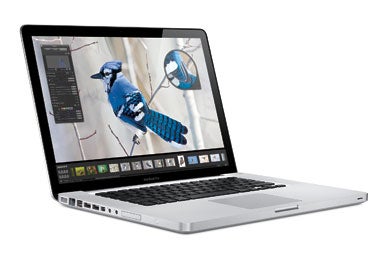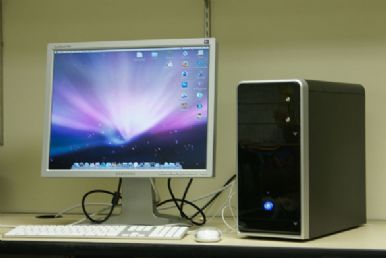2008 Flashback:Top ten Mac things of '08
I don’t know about you, but I’m about ready to file 2008 under “L” for “Let Us Never Speak of This Again,” before padlocking the file cabinet and heading on into 2009 with nary a glance in the rear view mirror. But before I can do that, let’s put a final stamp on the past year with a look at the top 10 stories that hit the Mac market in 2008, a grand and glorious tradition that dates all the way back to last year.
Stories are ranked 10 to one in ascending order of importance, based on a number of factors including the overall impact on the Mac market and Mac users as well as the potential to influence events deep into the coming year. The 10 entries were selected by a panel of me, following a lengthy debate between me and the voices in my head. This is one man’s opinion, in other words—if you think that I overlooked, overemphasized, or overrated a Mac-related happening, feel free to let me know about it in the comments.
Let’s begin the countdown, shall we?
10. Unibody laptops

Apple brought the MacBook Air's unibody construction to the MacBook and MacBook Pro.
9. Psystar and "Hackintosh"

When is a Mac not a Mac? When it's a Psystar Open Computer.
A related trend this year: people using the standard PC parts that Apple uses in their Macs to assemble generic PCs, then installing Mac OS X on them. Even our own Rob Griffiths gave it a try, creating his own "Frankenmac."
8. Apple pulls out of Expo
Speaking of news events that will be felt long after 2008 is just another memory, Apple announced that the 2009 Macworld Conference & Expo in San Francisco would be the last it would participate in, as part of the company’s strategy to eliminate trade shows from its marketing efforts. While next week’s Expo will go off as planned—though with Apple executive Phil Schiller delivering the keynote instead of CEO Steve Jobs—all bets are off as to what form Macworld Expo will take in 2010. An early glimpse could be available next Wednesday, when Expo organizer IDG World Expo hosts a community forum on the future of the Mac trade event.
7. The MobileMe launch
At the Worldwide Developers Conference in June, Apple unveiled plans to rebrand its .Mac online services as MobileMe, emphasizing the ability to sync calendars, contacts, and e-mail between Macs, PCs, and mobile devices like the iPhone. What could possibly go wrong? Well, for starters, Apple attempted to raise the curtain on the rejiggered service at the same time as the iPhone 3G, iPhone 2.0, and App Store launches. The result was a mistake-marred launch that extended into a summer of snags and service outages. Even Jobs conceded that the service “was simply not up to Apple’s standards,” and the company wound up offering free extensions to aggrieved subscribers. For a company that usually enjoys the Midas touch with product rollouts, MobileMe was an uncharacteristic pratfall.
6. Software goes online
Apple wasn’t the only company to see that the future of software includes Web-based services. A number of companies—from Intuit to Adobe to, of course, Google—have touted Web-based services that augment, and sometimes replace, traditional desktop-based offerings. Even Microsoft plans on getting into the act, announcing that the next version of Office will include lightweight versions of its apps accessible through a browser. And yes, Mac users, that includes the Mac OS X versions of Firefox and Safari.
5. Apple’s ongoing financial success
Even as the economy was beginning to crumble, Apple continued to enjoy strong sales and profits. In its fiscal fourth quarter ending in September, for example, the company reported quarterly record sales of both Macs and iPhones. Can Apple keep it up now that the recession is in full swing? Steve Jobs outlined the company’s plan for weathering an economic downturn during an October conference call with Wall Street analysts. We’ll see how well that plan is going in January, when Apple unveils its fiscal first quarter numbers.
4. Snow Leopard
It seems odd to give so high a ranking to a yet-to-be-released OS update that merited just a brief comment from Jobs during his WWDC keynote and a terse press release sketching out some of the features. But Snow Leopard, the code-name for the next major update to OS X, figures to have a heavy influence on Mac users in 2009. Apple says to expect the update, which is focusing on performance enhancements as opposed to the marquee features that Leopard delivered, by the middle of the year.
3. Rumors about Steve Jobs’ health
It’s nothing but gossip—and particularly distasteful gossip at that—but there’s no denying the impact that ongoing Internet chatter about Steve Jobs and his future at Apple have had on the company. Whenever he appeared at an Apple press event this year, Jobs was subject to the kind of scrutiny about his appearance that an American Kennel Club judge would find intrusive. Every decision Apple makes—its Expo opt-out is just the latest—is now viewed through the prism of speculation about the CEO’s health. And there’s a more immediate impact too—a false report of a Steve Jobs heart attack posted in a CNN user-generated content site caused Apple’s stock to tumble 10 percent in October, raising the specter of stock manipulation.
2. iPhone 3G goes global
Yes, Apple rolled out a second version of its popular smart phone, adding 3G networking capabilities and built-in GPS to the iPhone. But the real story was the worldwide spread of the iPhone prompted by the 3G’s release. At this time last year, the iPhone was available in four countries; now, you can buy one in more than 70. And the big target—China—is still in Apple’s sights.
1. The App Store
I can hear the “What is this, iPhoneworld” e-mails being typed now. But it’s undeniable that mobile apps were where the action was in 2008. Developers flocked to build iPhone apps—10,000 of them by Apple’s count—and consumers rushed to download them, passing the 300 million mark in early December. Were there complaints about how the App store was organized and the confusing rules Apple set up to approve native iPhone programs. Sure? But there was also a sense of excitement about establishing a new market, exploiting a new platform, and pushing the iPhone in new directions. Look for that excitement to carry us into 2009.
|